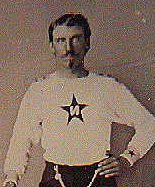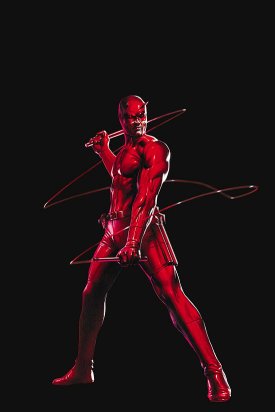|
|
|
For
six months, Jason Schachat's column was written
by Kevin Smith.
|
Jason
Schachat's Occasional Breakdown
12/20/05 Ah,
a week of endings, crossovers, and “to be continued”...
this is gonna hurt.
Well,
at least we get some minor relief with the finally released
final issue of the longest running Marvel mini-series not
to be written by Kevin Smith: Secret War #5.
Hard as it is to remember that this story started before
the advent of sliced bread, the disassembly of the Avengers,
Daredevil’s kingdom, and the decimation of the X-Men,
it does prove a little jarring to hop back onto this plotline,
but, hell, let’s give it a try, shall we?
Okay, to begin
with, Nick Fury’s still in charge of S.H.I.E.L.D.
...damn, did
I lose you already?
See,
this is what happens when a story arc or miniseries gets
so horribly delayed in these times of tenuous cross-continuity.
For the most part, Secret War was a black-ops story.
If not for Bendis’ trademark decompression, this whole
story would have been the first half of a single issue.
Instead, we built and built for three issues, then had our
huge fight scene last time around.
Now, we’re
faced with the former president of Latveria using C-list
supervillains to power a massive bomb that will take out
Manhattan. Why? Because Nick Fury leveled Latveria and left
her for dead. Why? Because she was funding C-list supervillains
to wage war on America.
After all that
rising action, she gets taken out remarkably quickly by
newcomer Daisy Johnson (a teenage S.H.I.E.L.D. agent with
Angelina Jolie’s looks and seismic powers). Then,
we finally get to the core of the story: Why does no one
remember the secret war in Latveria? What happened there
to make things as bad as they are?
And, in the end,
this is a Nick Fury story. A musing on what a man of action
does when faced with an imminent threat and whether that
man belongs in the employ of the American government or
not. Sure, he wronged many people, lied to his friends,
and disobeyed orders, but he also saved our nation and would
gladly do it all over again.
However,
as intelligently written as it is, the story isn’t
enough to justify the year and a half of delays.
|
|
As
confusing as the laws of physics that allow Daredevil
to throw his billy club around like this...
|
The
art, on the other hand, makes a good case for it. Despite
the usual Bendisism of repeating panels over and over, Gabriele
Dell’Otto delivers some of the best artwork we’ve
ever seen in a Bendis story, flooding scenes with light
and shadow, drenching characters with detail, and making
even a $3.99 price tag well worth it.
For anyone who’s
stuck with the miniseries this long, you should be satisfied
with this ending. For everyone else, wait for the trade
paperback to hit shelves and snatch it up ASAP. Without
the wait between issues, this story and art shine with more
thought and originality than any S.H.I.E.L.D. tale we’ve
seen in a long time. Without the wait, it’s definitely
worth the pesos.
On the
other hand, Marvel ends another miniseries on time but without
much fanfare in Ultimate Iron Man #5.
After months of build up, this series leaves us hanging
with the promise of another miniseries and little more.
We start out
with Tony Stark and company messing around at the Baxter
Building, toying with the components that will eventually
become War Machine and the Iron Man suit. For now, they
just have to put up with Tony’s non-brother Obadiah
and Tony’s father’s insistence on making cool
armor toys that might actually be useful to someone.
Thankfully, everything
goes to hell when Obadiah’s father is killed in prison
in such a way that Howard Stark becomes the number one suspect,
and Tony discovers booze shortly thereafter.
When it comes
to characterization and planting details, Orson Scott Card
is quite a talented writer. But, when it comes to big climaxes,
he’s not the most reliable of scribes. For the most
part, Ultimate Iron Man has been playing out with a decent
number of similarities to Card’s Ender books. The
sensitive boy-hero with a dark side, the scheming brother,
the school where children fight adults’ wars...
Unfortunately,
Card doesn’t end this miniseries with the big finish
of his Ender’s Game novella or even the epilogue-oriented
novel version. Instead, we seem to stop at an arbitrary
point while Marvel regroups and gets things in order for
the next mini. What we’re left with is an interesting
chapter, but nothing to get excited about.
Sure,
the reasoning behind the workings of the Iron Man armor,
Tony’s alcoholism, and his future with weapons manufacturing
are laid down in an interesting and enticing manner, but
the virgin flight of Iron Man ends too abruptly and with
too little fanfare to ready us for the wait until Ultimate
Iron Man 2. While it’s a decent read, this issue
really won’t be good for anyone unfamiliar with the
series and doesn’t tie-up a single plot thread. Hopefully,
the next miniseries will end things right.
page
2: Son of M #1 and Cable and Deadpool #23
|







